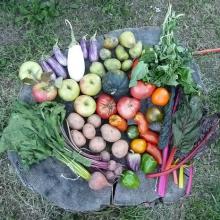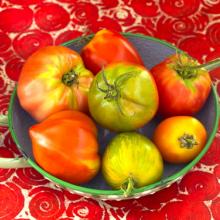vegetables
“Another world is not only possible, she is on her way. On a quiet day, I can hear her breathing.”
~ Arundhati Roy
Vegetables.
Who could have imagined an economy in which gentle vegetables were subversive?
But this is our world. A world where a vegetable, whose growth is imperceptible to the naked eye, can spider a crack into the concrete of our industrial food system.
We find ourselves in a food economy that sickens us. Health is divided along race and class lines: the food economy particularly sickens those whose wages do not allow them to buy the foods that can cure us of the diseases industrial “foods” cause.
Corporations, which do not speak the language of human love and health, wrangle to profit from the stream of ill Americans falling from the industrial foods conveyor belt. But we know that type 2 diabetes, heart disease, obesity, and some cancers are fully preventable by replacing part of what we eat with fruits and vegetables.
Why, in a wealthy, fertile country are we wrecking the environment to produce foods that kill us?
Hey, is this good news, or what?
Give up organic heirloom tomatoes at $4.99/pound!
Stop paying $5.99 up for a gallon of organic milk!
Buy cheaper ground beef than the organic grass-fed stuff at $7.99+/pound!
Slow down, folks. Read the articles, not just the attention-grabbing headlines. What the scientists discovered was basically this: Take two identical, ripe, juicy, fresh peaches, one of which was grown organically and one of which was not. Analyze the nutritional profile of each. You will find that one peach has just about the same vitamins as the other.
OK, and I'll bet they're pretty much the same color, too. And they probably weigh the same. And if dropped from a tall building, they most likely will go splat at about the same time.

